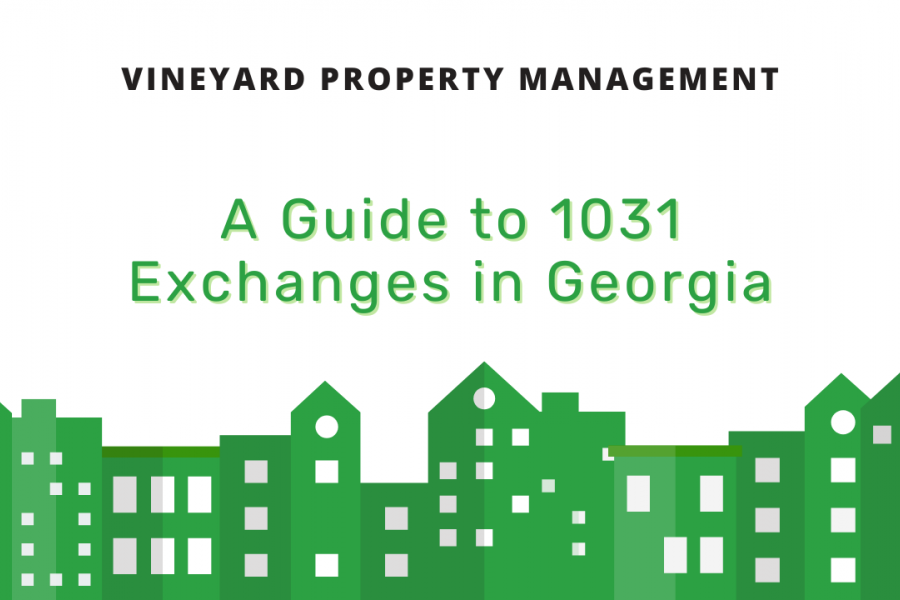
Key Takeaways
- 1031 exchanges in Georgia can be leveraged to improve your finances as a property investor.
- Without proper knowledge on 1031 exchanges, landlords can risk disrupting their finances and missing out on huge tax breaks.
- Partnering with a property management team can streamline your financial operations and lessen your workload.
Learn how we can help you maximize your home’s potential.
Are you thinking of selling one rental property to invest in another, but worried about the heavy tax hit? For Georgia landlords, a 1031 exchange can be a powerful strategy to defer capital gains taxes while growing your real estate portfolio. It’s a smart move, but only if you understand the rules, timelines, and property types that qualify.
In this guide, we’ll walk you through everything you need to know about how 1031 exchanges work specifically in Georgia. Whether you’re new to the concept or just need a refresher, Vineyard Property Management is here to help you explore whether this option fits your investment goals.
Unlocking the 1031 Exchange Advantage in Georgia
Understanding the core rules of a 1031 exchange is the first step to making confident investment decisions. Here are the key elements every Georgia landlord should know before starting:
Like-Kind Property Requirement
In Georgia, a like-kind property simply means both the property you sell and the one you buy must be held for investment or business purposes. This includes single-family rentals, commercial buildings, or land. It doesn’t mean the properties must be identical, just that they serve the same purpose.

For example, you can exchange a rental home in Atlanta for a commercial space in Savannah, as long as both are for investment. Understanding this rule helps you stay compliant and confidently plan upgrades or shifts in your portfolio without triggering capital gains taxes.
Property Use Rule
To qualify for a 1031 exchange in Georgia, both the sold and replacement properties must be used as investment or income-producing assets. You can’t use this exchange to trade your personal home or a vacation property. It’s designed for landlords aiming to grow or reposition their portfolios while deferring capital gains.
If you own a rental home in one area and plan to reinvest in another property in another, that’s fine, as long as both are strictly for rental purposes. Sticking to the intended investment use is key to protecting the tax-deferred benefits of the exchange.
45-Day Identification Window
After selling your rental property in Georgia, you have exactly 45 calendar days to identify your potential replacement properties. This identification must be made in writing and submitted to your Qualified Intermediary. The deadline is strict, and weekends or holidays do not extend the timeframe.
You can identify up to three properties regardless of their value or more under certain value-based rules. For example, if you sold a property in Marietta, you'll need to act quickly and strategically to list your intended replacements within this short window, so you don’t miss the opportunity for tax deferral.

180-Day Exchange Period
From the day you close on the sale of your investment property, you have 180 days to close on the purchase of the new one. This includes the 45-day identification period. So if your property is sold on March 1 in Columbus, your exchange must be completed by August 28.
Timing is everything, and failing to meet this deadline will disqualify the exchange. Working with professionals who understand Georgia’s real estate landscape can make this process much smoother. Plan ahead to avoid last-minute hurdles and ensure the exchange closes on time for full tax deferral.
Qualified Intermediary (QI)
In Georgia, landlords are required to work with a Qualified Intermediary (QI) to complete a 1031 exchange. A QI acts as a neutral third party who holds the proceeds from your property sale and ensures compliance with IRS rules. You, as the seller, cannot touch the funds during the process.
Choosing a reputable QI is essential, especially when timing and accuracy matter. Whether you're selling in Alpharetta or investing in Athens, the QI handles the transfer details so you can focus on selecting the right replacement property within the allowed timeframes.
Equal or Greater Value Rule
To fully defer capital gains taxes under a 1031 exchange in Georgia, your replacement property must be of equal or greater value than the one you’re selling. If your current property sells for $400,000, then your next investment should cost at least the same.

Additionally, all the proceeds from the sale must be reinvested, and any leftover cash (called “boot”) will be taxed. This rule ensures that your investment continues to grow without triggering a tax bill, making it a practical tool for landlords looking to scale or reposition their portfolio wisely.
Title and Ownership Consistency
When completing a 1031 exchange in Georgia, the name on the title of the sold property must match the name on the replacement property’s title. For example, if your LLC owns a rental property in Savannah and sells it, then the same LLC must purchase the replacement property.
This consistency helps maintain IRS compliance. Changing ownership types during the process can disqualify the exchange. Make sure to review how your current property is titled before starting, and keep everything aligned from start to finish to protect the exchange benefits and avoid complications.
Location Flexibility
Georgia landlords aren’t limited to exchanging property only within the state. As long as both properties are located within the United States and meet the investment-use criteria, you can sell a rental in Atlanta and purchase a new one in Charlotte, Dallas, or anywhere else nationwide.
This flexibility allows you to adapt your portfolio to shifting market conditions or personal goals. Just remember that Georgia’s closing processes and timelines may differ from other states, so it’s important to plan accordingly and work with professionals who understand how interstate exchanges operate.

Make the Most of Your Next Move
Navigating a 1031 exchange in Georgia doesn’t have to feel overwhelming. With the right guidance, it can be a smart way to grow your investment portfolio while deferring taxes. Vineyard Property Management understands the local market and what landlords need to succeed.
Whether you're planning to sell, reinvest, or simply explore your options, their team can help you make informed decisions. Reach out to Vineyard Property Management today to discuss what approach fits your long-term goals best.
